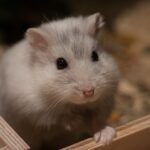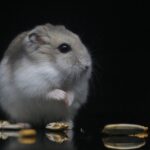Can Hamsters Eat Melon? — Expert Analysis
Hamsters are adorable and beloved pets, known for their small size and cute antics. As responsible pet owners, we must ensure that we provide our furry friends with a balanced diet that meets their nutritional needs. But can hamsters indulge in the juicy goodness of melon? Let’s explore the suitability of melon as a food option for hamsters.
The Benefits of Melon for Hamsters
Melons, such as watermelon and cantaloupe, contain high water content, making them a hydrating snack for hamsters, especially during warmer months. Moreover, melons are a rich source of essential vitamins and minerals like vitamin C and potassium.
- Vitamin C helps boost the immune system of hamsters, preventing them from falling ill easily.
- Potassium aids in regulating blood pressure and maintaining proper muscle function in hamsters.
Hydration for Hamsters
Hamsters, being small mammals, are prone to dehydration. Offering them melon can contribute significantly to their daily water intake, ensuring that they stay properly hydrated. However, moderation is key, as excessive water consumption can lead to diarrhea or other digestive issues in hamsters.
Vitamin C Boost
Including melon in your hamster’s diet provides them with a natural source of vitamin C, which aids in collagen production and enhances their overall health. This vitamin plays a crucial role in preventing scurvy, a condition that hamsters can also be susceptible to.
Feeding Frequency and Quantity
When it comes to feeding melon to your hamster, it is important to offer it in small, bite-sized pieces. One or two small cubes of melon, once or twice a week, would suffice as a special treat for your furry friend. Remember to remove any uneaten portions promptly to prevent mold or bacteria growth in the enclosure.
Potential Cautions for Feeding Melon to Hamsters
While melon can be a safe and tasty treat for hamsters, it is essential to exercise caution. Some points to be mindful of include:
- Always wash the melon thoroughly before offering it to your hamster, ensuring that no harmful pesticides or chemicals are present.
- Remove any seeds or rind from the melon, as these can pose a choking hazard for your hamster.
- Introduce melon gradually into your hamster’s diet to gauge their tolerance and prevent any digestive discomfort.
Can Other Pets Enjoy Melon Safely?
Interestingly, melon can be a delightful and healthy treat for other pets, such as guinea pigs and rabbits, as they also benefit from the hydrating properties and the nutritional value it offers. However, different pets have varying dietary requirements, so always consult with a veterinarian before introducing any new food to your furry companions.
Conclusion
In conclusion, melon can be a safe and enjoyable addition to a hamster’s diet when offered in moderation. Its high water content, along with essential vitamins and minerals, brings numerous benefits to hamsters. Remember to pay attention to feeding frequency, remove any uneaten portions, and take necessary precautions. As caring pet owners, let’s treat our hamsters to a well-balanced and diverse diet that ensures their health, happiness, and overall well-being.






